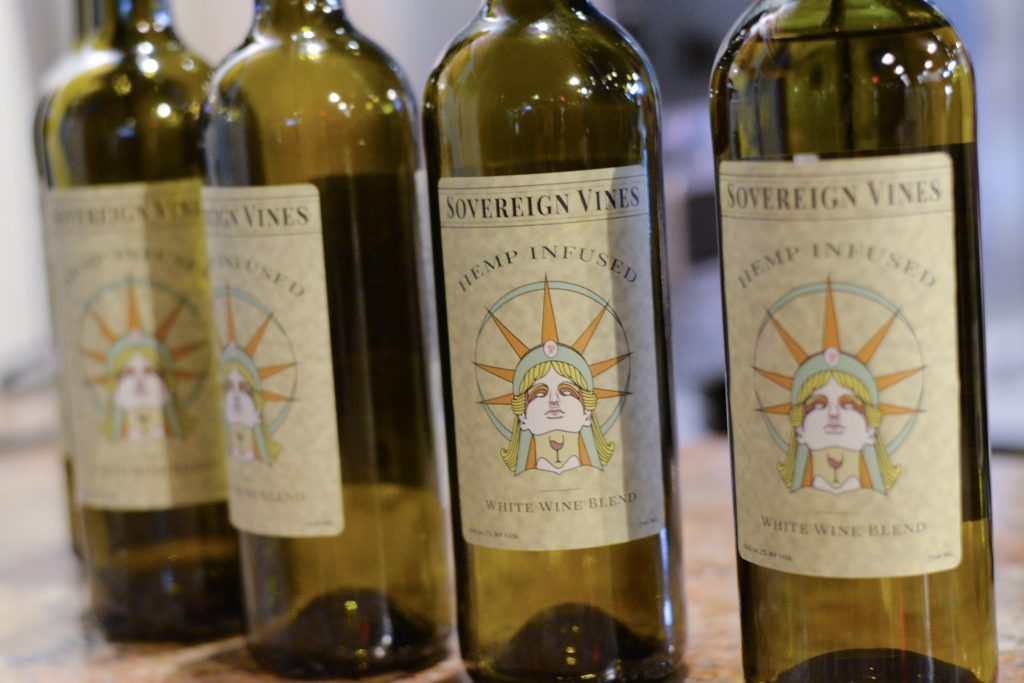
A student who founded the first hemp company in Broome County has officially launched his first hemp-infused wine.
Friday night at Despina’s Mediterranean Taste, Kaelan Castetter, a junior majoring in political science, hosted a launch party for Sovereign Vines. This product is the first hemp wine varietal from his student-run startup, Innovative Bottling Inc.
“We believe that this is innovation in wine,” Castetter said. “We think the United States is ready for it.”
Around 100 people attended the event, including local politicians Assemblywoman Donna Lupardo and Broome County Executive Jason Garnar. Castetter’s business has received support from Binghamton University as well; he is in frequent contact with the Entrepreneurship and Innovation Partnerships office and has two Career Development Centralized Internship Program interns working for him — one as an accountant and one as a laboratory technician.
Laura Holmes, assistant director of Entrepreneurship and Innovation Partnerships, has been a main point of contact for Castetter at the University.
“Kaelan [Casetter] came to us close to two years ago with this idea,” Holmes said. “It’s a great story, beginning with his dad.”
Castetter’s father, Jim, attempted to launch a similar product in the 1990s, but was restricted by government regulations on hemp. Since then, regulations have changed, allowing Castetter to reignite the initiative with himself as CEO and his father as president.
“The most rewarding part of this launch is watching him be successful,” Holmes said. “My students are like my kids; I’m proud of them the same way. And I’m a huge supporter of the hemp movement in New York.”
Castetter attributed his successful launch to the support of his friends and the Broome County community.
“I knew that there was an opportunity to do what my dad had done,” Castetter said. “I was looking for something new that I could do that would really mean something. I joined [the Delta Sigma Phi fraternity] and Rohan [Nayyar] was the vice president, and they really gave me a lot of support. Also, Binghamton itself is really an environment that inspires confidence.”
The legal status of hemp is somewhat complicated and frequently changing. In August 2016, Gov. Andrew Cuomo signed Assembly Bill A9310A, legislation introduced by Lupardo that allows for the transportation, processing, sale and distribution of hemp in New York.
Federal rules also apply to hemp products. The Bureau of Alcohol, Tobacco, Firearms and Explosives, which Castetter said regulates hemp food and beverage products at a federal level, has declared hemp-infused beverages may be sold, so long as they do not use marijuana-themed advertising or contain any traces of THC, the primary psychoactive ingredient in marijuana.
The grapes for the wine come from Glenora Wine Cellars, and Cayuga grapes are the base of the white wine blend. The wine is bottled at a Sovereign Vines facility in Johnson City.
Shayan Khan, a senior majoring in political science, said that he liked the aesthetic of the wine and that he had purchased a bottle after sampling it.
“I like sweeter wines and a lot of people don’t,” Khan said. “A lot of people like drier wines. This one’s really in the middle — not too sweet. It has a kind of earthy taste. I think that’s the best way to describe it, but I don’t exactly know what hemp is supposed to taste like.”
According to Lupardo, the hemp industry could play a crucial role in revitalizing the Southern Tier’s economy. She said that many companies will be able to use hemp as a raw material.
“Up until recently, all of those raw materials had to be imported from Canada or Europe,” Lupardo said. “Now those business will be able to use homegrown products in states like New York and a few others that are allowing this industry to grow.”
Lupardo said that she hopes hemp will provide rejuvenation for some of the currently fallow farmland in the Southern Tier.
“It shows that we can have a rebirth in manufacturing, not necessarily building shoes or widgets or computers, but [by] using an agricultural commodity that could be processed into multiple uses,” Lupardo said. “It’s really going to be the thing for our economy and a very different thing than we’ve seen before.”


